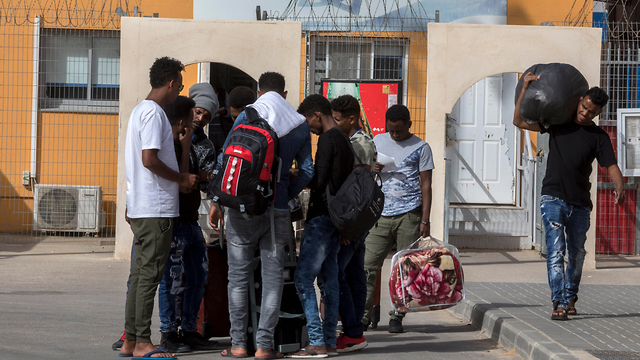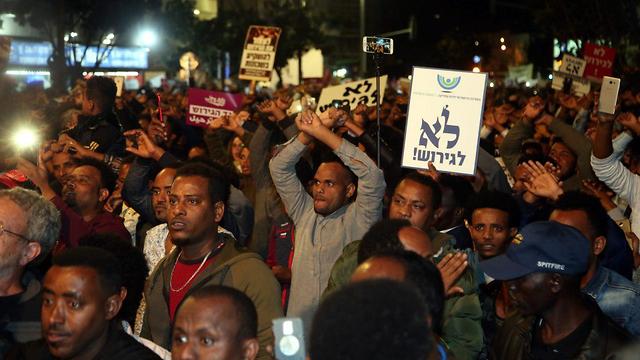
Migrants near the now shuttered Holot facility
Photo: Reuters

High Court issues temporary injunction blocking migrant expulsion
In panel of 3 justices that included Chief Justice Hayut, High Court rules to issue injunction temporarily blocking asylum seeker expulsion until state's reply to petition seeking to scrap it; injunction will not apply to migrants leaving Israel willingly, preparations for expulsion.
The High Court issued a temporary injunction for the state, ordering it to halt the expulsion of asylum seekers from Israel until it submits a response to a petition made to the court against the expulsion. The state's reply, the justices ruled, must be submitted by March 26.
According to the ruling by Chief Justice Esther Hayut, Deputy Chief Justice Hanan Melcer and Justice Neal Hendel, the injunction will not apply to anyone agreeing to leave Israel willingly. The order, moreover, will not apply to preparations for the expulsion, which may go through as planned.
Nearer to the state submitting its reply, the court ruled, it will be decided whether to extend the injunction. The Holot migrant detention center, meanwhile, was closed Wednesday.
The "Stop the expulsion" movement commented on the High Court's decision, saying, "The expulsion's mechanism is slowly crumbling. The idea that the State of Israel will expel to refugeedom thousands of human beings is incomprehensible. We hope this is the first sign en route to stopping the expulsion completely."
Shula Keshet, one of the leaders of the "South Tel Aviv against the expulsion" group, said, "The High Court's decision must not only be a first step to stopping the expulsion, but also a wakeup call to the Israeli government to change its policy—stop the evacuations of residents of the city's south and rehabilitating neighborhoods."
Sheffi Paz, of the "South Tel Aviv Liberation Front," however, attacked the High Court's decision. She said, "This injunction has no legal basis. It was born only of the fear felt by High Court justices who have suddenly found themselves approving an expulsion they never intended to approve, because they placed a small landmine in their previous ruling that (Prime Minister Benjamin) Netanyahu was able to defuse.
"South Tel Aviv residents scorn the justices and legal clerks, who fail to do their jobs. We don't have one iota of trust in the legal system, and will therefore renew protests outside the home of Chief Justice Hayut in Tzahla, a (north Tel Aviv) neighborhood no infiltrator resides in."

Protesters calling for the expulsion. Protests will return to Chief Justice Hayut's Tzahla home Saturday night (Photo: AFP)
The High Court's verdict was handed down on a petition submitted six weeks ago by 119 human rights activists, in which they sought to freeze the agreement the government had reportedly signed with Rwanda regarding receiving asylum seekers deported from Israel.
Sigal Avivi Kook, one of the petitioners, welcomed the court's decision, saying, "The injunction is an important step that we hope will prevent the continued implementation of the expulsion plan.
"The court's decision will also allow to work specifically for the release of asylum seekers incarcerated in the Saharonim detention center under the expulsion plan, since their incarceration has been voided."
Petitioners, represented by attorney Itay Mack, claimed that Prime Minister Netanyahu, Justice Minister Ayelet Shaked, Attorney General Avichai Mandelblit and Interior Minister Aryeh Deri sharply overstepped their authority to administer foreign relations and from the articles of the law regulating entrance into Israel when they approved the agreement with Rwanda.
The agreement, they said, was highly irregular and hitherto unheard of in the country's history, adding it constituted a moral stain that could never be expunged, and that only the Knesset could make decisions of such magnitude.

















